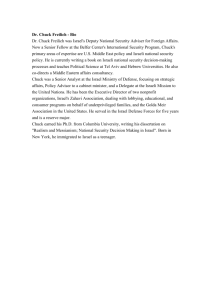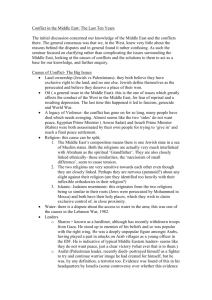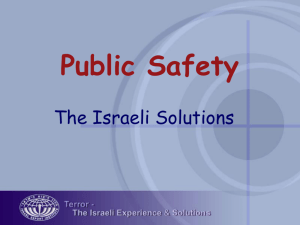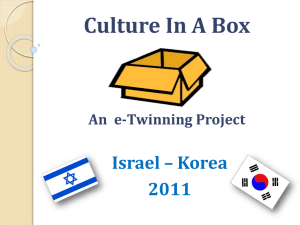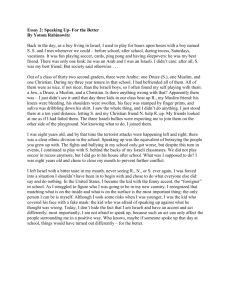miri eisin
advertisement
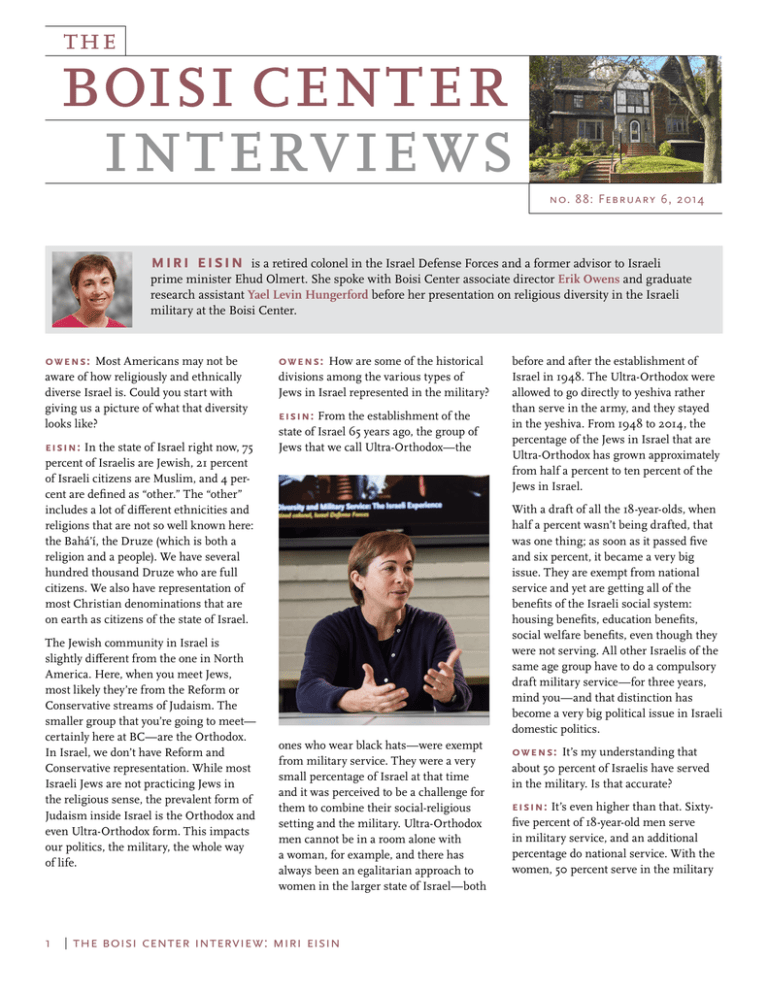
the boisi center interviews no. 88: February 6, 2014 miri eisin is a retired colonel in the Israel Defense Forces and a former advisor to Israeli prime minister Ehud Olmert. She spoke with Boisi Center associate director Erik Owens and graduate research assistant Yael Levin Hungerford before her presentation on religious diversity in the Israeli military at the Boisi Center. owens: Most Americans may not be aware of how religiously and ethnically diverse Israel is. Could you start with giving us a picture of what that diversity looks like? eisin: In the state of Israel right now, 75 owens: How are some of the historical divisions among the various types of Jews in Israel represented in the military? eisin: From the establishment of the state of Israel 65 years ago, the group of Jews that we call Ultra-Orthodox—the percent of Israelis are Jewish, 21 percent of Israeli citizens are Muslim, and 4 percent are defined as “other.” The “other” includes a lot of different ethnicities and religions that are not so well known here: the Bahá’í, the Druze (which is both a religion and a people). We have several hundred thousand Druze who are full citizens. We also have representation of most Christian denominations that are on earth as citizens of the state of Israel. The Jewish community in Israel is slightly different from the one in North America. Here, when you meet Jews, most likely they’re from the Reform or Conservative streams of Judaism. The smaller group that you’re going to meet— certainly here at BC—are the Orthodox. In Israel, we don’t have Reform and Conservative representation. While most Israeli Jews are not practicing Jews in the religious sense, the prevalent form of Judaism inside Israel is the Orthodox and even Ultra-Orthodox form. This impacts our politics, the military, the whole way of life. 1 before and after the establishment of Israel in 1948. The Ultra-Orthodox were allowed to go directly to yeshiva rather than serve in the army, and they stayed in the yeshiva. From 1948 to 2014, the percentage of the Jews in Israel that are Ultra-Orthodox has grown approximately from half a percent to ten percent of the Jews in Israel. With a draft of all the 18-year-olds, when half a percent wasn’t being drafted, that was one thing; as soon as it passed five and six percent, it became a very big issue. They are exempt from national service and yet are getting all of the benefits of the Israeli social system: housing benefits, education benefits, social welfare benefits, even though they were not serving. All other Israelis of the same age group have to do a compulsory draft military service—for three years, mind you—and that distinction has become a very big political issue in Israeli domestic politics. ones who wear black hats—were exempt from military service. They were a very small percentage of Israel at that time and it was perceived to be a challenge for them to combine their social-religious setting and the military. Ultra-Orthodox men cannot be in a room alone with a woman, for example, and there has always been an egalitarian approach to women in the larger state of Israel—both the boisi center interview: miri eisin owens: It’s my understanding that about 50 percent of Israelis have served in the military. Is that accurate? eisin: It’s even higher than that. Sixtyfive percent of 18-year-old men serve in military service, and an additional percentage do national service. With the women, 50 percent serve in the military and an additional percentage of women do national service. equality of service and rights and citizens of the state of Israel. going to command a unit, then I can’t command an Ultra-Orthodox unit? owens: The Israeli Supreme Court recently made an important ruling that related to the funding of yeshivas which will have a correlate effect on conscription. Could you speak about those developments? owens: So the Supreme Court decision will presumably be superceded by any law that is passed in coming years? Right now there are small segments of the Ultra-Orthodox community that are drafted. There has always been a small amount who served. Two battalions were built for them. In those two battalions, there are no women. If it’s two battalions, that’s one thing, but we have dozens of battalions. What are you suddenly going to do? Are you going to have women-less ones and not women-less ones? How do you build that sort of thing? It has an impact throughout society. These are part of the dilemmas that have come out now, which is why they haven’t found the terminology to both recognize women’s rights and address the equality of everybody serving. eisin: The domestic issue in Israel became such where people petitioned the Israeli parliament, and then they went to the Supreme Court and said, “How can it be that there’s a segment of society that isn’t equal? Why do we have to serve, and by what right do they not have to serve?” The Supreme Court of Israel, over a decade ago, told the legislature that that law exempting yeshiva students from the draft would have to change. We have a Basic Law in Israel about the equality of our personal rights. If somebody is drafted, another person can’t just be exempted. For the last 10 years the Israeli legislature has been trying to build legislation that would draft the Ultra-Orthodox. To clarify: we are not talking about the Modern Orthodox, who are featured in the image you used for the event today. We are talking about the Ultra-Orthodox, who have not been drafted. One of the main issues in last year’s elections in Israel was this legislation and the draft. A law has still not been passed. The day before yesterday, the Israeli Supreme Court said, “OK, thank you very much. We are now telling that you have to stop the funding of the yeshivot. The yeshiva students can’t be funded by the state if they’re not doing equal service.” That happened on Tuesday, and today the Israeli finance minister cut the funding to the yeshivot. This morning, the Ultra-Orthodox Haredi community came out to protest on the roads in Israel. They closed off one of the main thoroughfares with demonstrations. I’ll remind you, it was a Supreme Court decision that said the legislature has not stood up, and it has to do with the 2 eisin: They have not yet arrived at agreed upon legislative language. They haven’t yet arrived at a formula that could pass. The law has become a very controversial issue—perhaps also because of what I represent, namely, women. “Over the last 20 years, the Israeli militar y has taken enomous steps toward having the ser vice for the men and the women in the IDF be as equal as possible.” owens: That’s a terrific entré into the primary themes you’re talking about today, in terms of the accommodations within the military. You mentioned the Ultra-Orthodox and their relationship to female soldiers. What other types of accommodations do you see within the military for different religious practices? This is something that Americans are starting to deal more and more with, and I’m wondering how the IDF handles this. eisin: We have three main minority groups that are drafted into the IDF. Over the last 20 years, the Israeli military has taken enormous steps toward having the service for the men and the women in the Israel Defense Forces (IDF) be as equal as possible. The Ultra-Orthodox are an enormous challenge in any case, but one of the direct impacts was all that has been done to promote equality of women. You bring in the Ultra-Orthodox because they should be serving, but they’re not allowed to be alone with a woman in a room. The backbone of the Israeli military’s instruction corps is entirely women. So now you have to train a whole separate corps of men because of the Ultra-Orthodox? I’m a colonel: if I’m the boisi center interview: miri eisin The Druze, which as I said is a separate religion as well as a separate ethnicity (they speak Arabic). Druze men are drafted. So the first accommodation is that Druze women are not drafted. In dialogue with the heads of the community, it was decided upfront that the Druze men would do the same service as the Israeli Jews, but the women would be exempt. So that’s an accommodation of a sort. The Druze community is very similar to other communities where they have some people who are full-time religious, and others who are still within the community but are not actively observant. The ones who serve in the military are the ones who are not observant. Those who are religious are usually not even drafted; like the Ultra-Orthodox community, they go into their religious schools. The Druze have their own holidays, which are fully recognized by the IDF. Now it’s funny in that sort of thing because for Jews, Shabbat (Saturday) is the day off. The Druze don’t have a day off. So they take off Friday like the Muslims because they came out of the Muslim world, though they are not Muslim. They have all sorts of accommodations in that sense, that they live within the world of their reference. So they’re inside the Jewish calendar world, and they get all the Jewish calendar holidays just like we all do, and they additionally get their own holidays. Another minority are the Muslims. The Bedouin Muslims are not drafted in Israel. One of the things that the state of Israel did in 1948 when it was established—at the exact same time that it gave an exemption to the UltraOrthodox, because of the difficulties of incorporating them into the military world—was exempt the Muslim and Christian Arabic-speaking communities from military service. But there has been dialogue on this and things are beginning to change. I want to give you the following example of things that have changed, and I don’t even know if you’re aware of them. Last summer, a Christian Greek Orthodox priest from the city of Nazareth got a whole group of people, and they said, “Why aren’t we drafted? How come we’re exempt? We’re not Muslim, we’re Christian. We’re citizens of the state of Israel, we’re happy to be citizens of the state of Israel, and we want both the benefits and the recognition of being drafted.” And this year, 150 Christian-Arab citizens of Israel were drafted in the same draft process. It’s the beginning. It’s a small number. It was only done to those who volunteered to be drafted, but they were fully drafted. It’s part of the dialogue within Israel with one of our other groups of minorities. Interestingly enough, some women also wanted to be drafted, so they 3 actually have four Christian women who were drafted. We already have a Christian officer, a woman, who was drafted and has gone through officer courses. See, that’s part of the development that happens. hungerford: Do the non-Jewish soldiers in the Army serve with Jews, or in their own units? eisin: It’s absolutely mixed. When the Druze were first drafted, they had a Druze battalion. Around 20 years ago, though, the Druze said they didn’t want to just serve in the Druze battalion. We had Druze generals long before we had women generals. We only have one woman major general. We’ve had two Druze major generals. We’ve had a single-digit number of women brigadier generals. Again, women are half of Israeli society, and the Druze are a couple hundred thousand, and they’ve already had lots of generals. Right now the commander of the most elite infantry brigade, Golani, is a Druze. There still is a Druze battalion—which is more comfortable for some—but if you do not want to serve there, you serve all over. My background is military intelligence. The Druze community are very well represented at the highest ranks—higher than mine—in the military intelligence community of Israel. That says a lot. the boisi center interview: miri eisin The Bedouin are the remnants of the nomadic Arabs of the Middle East; they are in Israel and Jordan, all over the Middle East. (The bulk of the Arab Israeli citizens are not Bedouin.) Among the Israeli Bedouin, there are specific tribes that volunteer. It’s only the men, not the women, and most of them are trackers. Trackers are the people that, when somebody infiltrates, they know how to follow tracks. I always give the example at the end of Butch Cassidy and the Sundance Kid; at the end of Thelma and Louise, also, there are trackers. There is a Bedouin battalion down south on the Israeli-Egyptian border, which is made up mainly of Bedouin fighters. So again, they can be in their own units and they can encompass other ones. I was up north with an AIPAC (American Israel Public Affairs Committee) group at the end of the summer, on the Lebanese border. A Bedouin lieutenant colonel friend of mind, Madgti, who commands the tracker forces up north, came to speak to this group of 100 very prominent politicians—they brought in first the Democrats and then they brought in the Republicans, and it happened to be the Democrat group that Steny Hoyer was the head of, and here from Massachusetts was Joe Kennedy, Jr., amongst others. Madgti came to visit and how does he introduce himself? He says, “I’m a Bedouin, I’m an Arab, I’m a Muslim, I’m an Israeli, I’m all of the above. What am I more? I don’t know. I’m a Bedouin, I’m an Arab, I’m a Muslim, I’m an Israeli.” That’s part of the complexity, and he’s a lieutenant colonel in the Israeli military. As for the Christians, I want to add the following thought: From 1990 to 1999, Israel grew twenty percent in population. Most of that growth of a million people within ten years was from the former Soviet Union breaking up, and the bulk of the people who, under the Israeli Law of Return, were allowed to come to Israel and get immediate citizenship. The Law of Return—dating to 1951—applies to those deemed Jewish not by religious authorities, but by the legislative authorities. The legislative definition followed the Nuremberg laws of 1933, where they said that under the Nazi regime, if you were a quarter Jewish you would be killed, you would be murdered. So in the state of Israel, if you’re a quarter Jewish, that’s enough to be able to come and get immediate citizenship. It doesn’t make you a Jew. It means that you’re allowed to come and be a citizen. My point being that under that Law of Return, of the million that came in, certainly 100,000 to 150,000 are not Jews under the religious laws. But they came because they’re a quarter Jewish, one of their grandparents is Jewish. They are drafted in the regular Israel law. They’re fully Israeli. These are kids that have mainly been born in Israel, but they can be practicing Christians. And they serve the exact same service within the IDF in all of the units. hungerford: We’ve mentioned the fault lines between the religious and the non-religious a little bit in this conversation. Historically, Israel has also had fault lines between Ashkenazim and Sephardim, and now with the Russian immigrants, and the Ethiopian immigrants as well. Most of those people have fit into different socioeconomic groups 4 and have had different educational backgrounds, etc. In the American experience of the draft, the military has acted as a great democratizing force, mixing people from different backgrounds, allowing them to get to know one another. Even today, when there is no longer a draft, the military often serves as a tool of advancement for people from low socioeconomic backgrounds. There’s a higher proportion of black officers in the U.S. military than “Under the Nazi regime, if you were a quar ter Jewish you would be killed. So in the state of Israel, if you’re a quar ter Jewish, that’s enough for citizenship under the Law of Return.” there are blacks in the overall population, for example. Would you say the same about Israel’s military in terms of helping to raise up people from less advantaged backgrounds? Or do political connections help certain individuals in the military and work to reinforce the situation of the general population? eisin: In Israel the draft is an equalizer which equalizes out both your background and your future. The military gives you the opportunity, the boisi center interview: miri eisin depending on where you come from, to finish a high school diploma. Israeli society tries to fix itself in the military— to compensate there for the different disadvantages people might have had in their backgrounds. In Israeli society at large, Ethiopians’ distinct disadvantage is that parents can not help their children with their education, with their school work. This is not the case with the Russians, by the way; the parents are usually more educated, they can help the kids themselves, and they’ve done well. Interestingly enough, the Russians have not seen the military as a career, but boy, have they boosted our high tech. Ethiopians have seen the military more as a career because for them, it’s a real transitional stage. But this isn’t just true now with the Russians and the Ethiopians; it’s true throughout the 65-years existence of the state of Israel. Let’s look at the IDF’s chief of the general staff, for example. The chiefs of staff in Israel are not always Ashkenazi-born, third-generation Israeli pioneers. We had Shaul Mofaz, who immigrated when he was a nine-year-old— without anything—from Persia, from Iran. He became the chief of staff. That’s the equalizing kind of thing that we have in Israel. You get that time and time and time again. We have lots of challenges concerning the different sections of society because we don’t have the separation of religion and state. At the end, that lack of clearcut separation is challenging because we’re a Jewish democracy, and inside the military we recognize all of the different minorities but all of the eating halls in the Israeli military eat kosher, eat by the Jewish law. As the Modern Orthodox have become more conservative, they have adopted stricter standards of kashrut. The Druze in the military now suddenly know the kashrut laws better than I do, because I haven’t been in the military for the last 10 years. That segment of the IDF that deals with military dining is run right now by Ultra- Orthodox, not even Modern Orthodox, so it makes it even more extreme. How do you balance these challenges? I want to give another example, which, to me, is a very harsh one. The IDF is an equalizer, and if it’s an equalizer, you have all sorts of units you don’t usually have in the military. You have education units to help soldiers finish high school, not to learn the military profession. We have a special unit in the IDF to take people who are underprivileged to kind of bring them up to par. We also have always had theatrical groups. I don’t even know if you have that here. In the military, we have bands, the military army radio station, military theater, military orchestra, and military theme groups that are entertainment groups run by the military. It’s always comprised of mixed-gendered units, and as the Modern Orthodox have become more conservative, they’re not willing to listen to women singing. This conflict has started a dialogue in the last decade that we didn’t have in the first 55 years of the state of Israel. So that’s part of the challenges and the balances. Again, looking at this background banner, thinking of the state of Israel and its first thirty years as an independent, socialist, pioneering, egalitarian society at the kibbutzim; at that time, one in four officers was from a kibbutz. In 2014, one in four officers are Modern Orthodox. owens: Given the influence of the Orthodox on military life in some ways that you’ve spoken of, can you speak a bit about military discipline? There were some reports in the U.S. media during Operation Cast Lead—and I can’t speak to their veracity, of course—of worries about overzealous religious Zionists, or about conflicting orders about how to treat civilians in Gaza, etc. Could you give us some insight on how that issue is seen inside the military? eisin: When we talk about “military and ethics,” there are those who will say it’s 5 This photo of Israeli soldiers during their morning prayer was used as a backdrop image at the event. Ms. Eisin refers to the image in her interview. like a contradiction in terms. I’m not one of those. I think that there are absolutely ethics of military, but they’re within very challenging lines, because what you’re doing is killing people. Of course there’s going to be that basic question of any type of violence in war being unethical. But I don’t come from that point of view. I think the IDF strives to the highest ethical base, of teaching people the clear lines of what is allowed and what is not allowed; what is civilian and what is not; what is combat and non-combat. Does that mean we don’t have exceptions? We have exceptions. They’re also taken care of within the IDF. We put them on trial. Matters also have to be understood in the right context. One of the problems that we have right now is that the combatants we’re fighting do not wear uniforms. Talk about a dilemma. I want to give an example from last week. I find it is an example about that ethical issue of how you teach soldiers. Last week there was an individual Palestinian, a 16-year-old, who came to an army military installation, took out a gun, started to fire the gun. Soldiers who were nearby killed him. He was firing a gun. It took a long time for the IDF to show the pictures of the gun, and nobody believed the boisi center interview: miri eisin us; everybody said, “see, they went and killed an innocent 16-year-old, and that’s the way they are.” When we put the picture out with the gun, everybody said, right, “you planted the gun afterwards.” And then the Palestinians—not us— posted his Facebook page from the day he died. Five hours before he went and fired at the outpost, he posted on his page that “today, I’m going to go be a shahid.” So life is complicated. Did we just kill an innocent 16-year-old? I come back also to the soldier who killed him. He’s 19 years old. I don’t want to have to think about that aspect of it. But when he was describing it—I heard it on the radio—I thought of morals and ethics and how you live with it. His description was the following: “I saw the enemy. The enemy was holding a gun.” He didn’t say a person. “I saw the enemy”—because that’s part of what you do. He saw an enemy. He didn’t see a 16-year-old Palestinian, he saw somebody with a gun. Just like when I’m wearing uniform, people don’t see my face, they see the uniform. When I’m wearing a uniform and a gun, nobody sees a person, they see the gun and perhaps the uniform. In these combat situations, sometimes you make mistakes. Mistakes are one thing, going too far is another, and we have to be there, on-line, all of the time. In that sense, I’m actually very proud of what we do, I think we do get a very hard side of the picture because our combatants are 16-year-olds who come with a gun, so what are we supposed to do? He’s sixteen; go home to mom? We’ve been doing a lot of work nowadays trying to engage parents to stop their teenage kids. Not easy, not easy. [end] The Boisi Center for Religion and American Public Life Boston College 2 4 Quinc y Road Chestnut Hill, MA 02 467 tel 617 - 55 2-1860 f a x 617 - 55 2-1863 publife@b c .e du Visit bc .e du/boisi-resources for a complete set of the Boisi Center Inter views and audio, video, photographs, and transcripts from our events. 6 the boisi center interview: miri eisin b oisicenter @b oisi _ center



